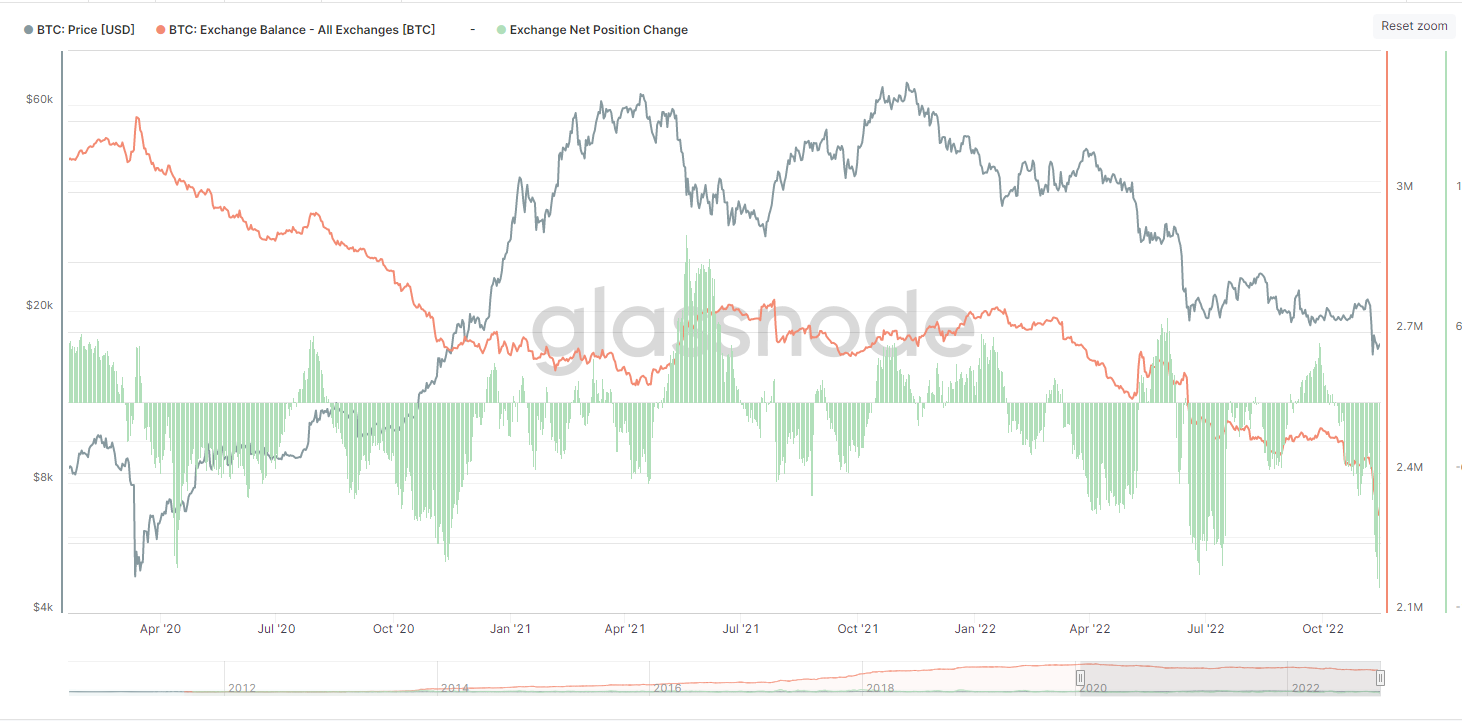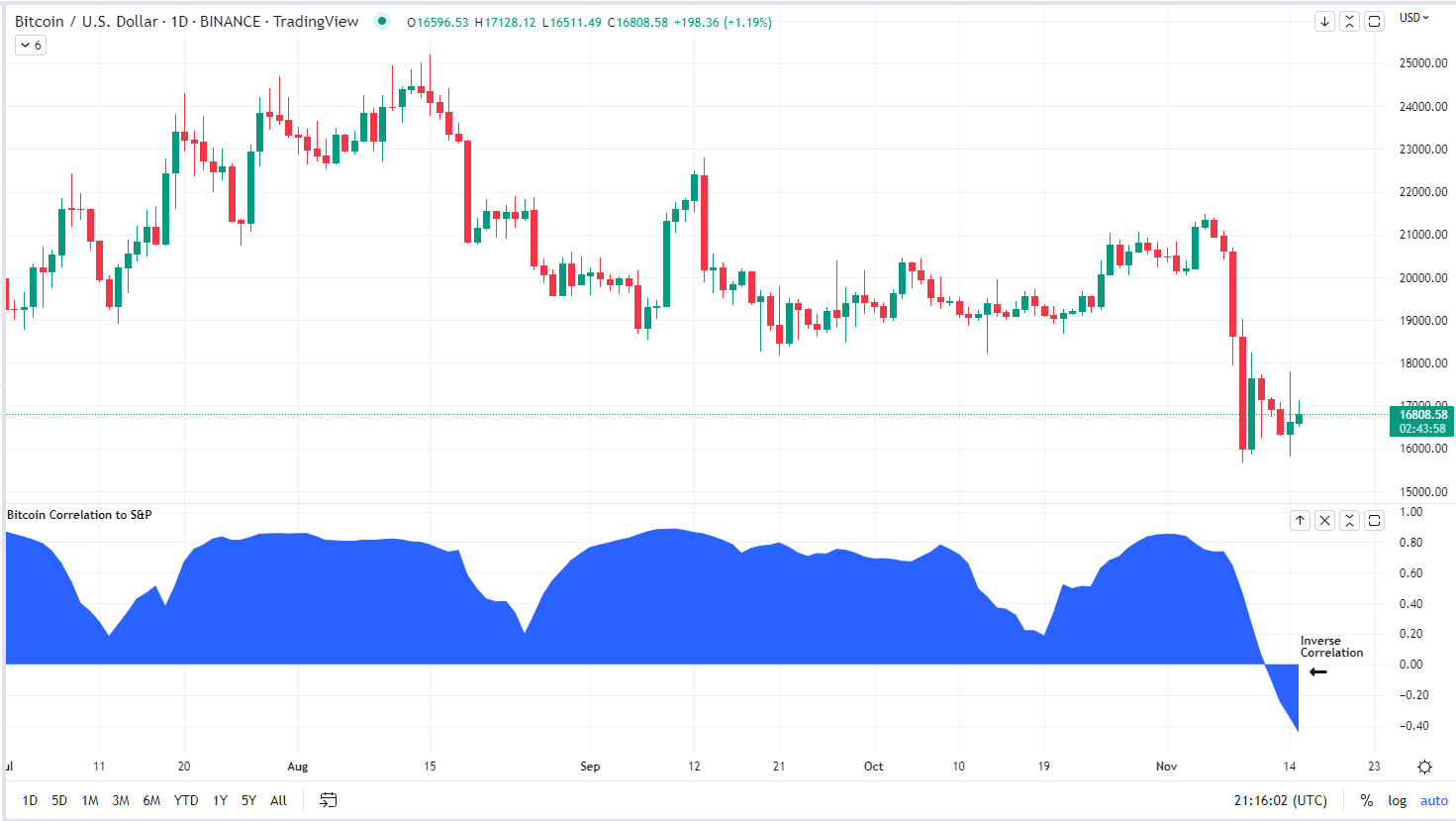Blockchain technology is ever-evolving, and so is the often subjective art of blockchain analysis.
Nowhere is that truer than now, in the wake of the collapse of Sam Bankman-Fried’s FTX exchange – as the crypto industry faces a radical reckoning with concepts like risk and trust.
Recent on-chain data shows a change in custodial attitude by investors, while implying a continued interest in acquiring and holding digital assets.
As the fallout from the FTX collapse widens, trust in centralized exchanges has reached an all-time low. It’s not irrational, given recent events.
Bitcoin and Ether Supply
Glassnode data shows that bitcoin withdrawals from exchanges have sharply increased, with BTC balances on these platforms falling by 72.9K BTC ($1.2B) in just seven days.
The metric looks to capture the movement of coins from exchanges and on to self-custody wallets. It's a measure of movement, not liquidation. Investors are essentially saying, “I trust the asset, but no longer trust you.”
The same is evident for ether (ETH), as investors withdrew 1.01 million ETH from exchanges over the past seven days.
The FTX collapse marks a new starting point in how investors use exchange balances of BTC and ETH. Often, increases in the exchange balances for BTC and ETH implies bearish sentiment, as coins are sent to exchanges to ready them for sale.
But a comparison of current levels to levels prior to November 2022 may give investors a distorted view.
Now, the outflows might be signaling something very different: that users don’t want their coins sitting on the exchange – as a precaution against the risk of another deposit run similar to what just happened at FTX.

BTC Exchange Net Position Change (Glassnode)
Stablecoin Supply
While the supply of BTC and ETH has declined on exchanges, the supply of stablecoins has increased. The significance of this is that stablecoins represent buying power. So as stablecoins move on to exchanges, investors are ensuring they have enough dry powder to be opportunistic.
Bitcoin and ether prices are under pressure as cryptocurrencies endure the current, harsh crypto winter.
BTC and ETH were trading sideways on Monday, albeit slightly more to the green. .
A key observation is that market correlations of cryptocurrency prices have shifted recently.
The two largest cryptocurrencies by market capitalization have been trading in lockstep as their correlation coefficient has increased to 0.99. Correlation coefficients range from 1 to -1, with the former indicating a perfectly direct relationship, and the latter implying a completely inverse one.
Since Nov. 7, the 30-DAY correlation between BTC and the S&P 500 has fallen from 0.79 to -0.44. For ETH, the shift was from .61 to -0.49.
Given the unique nature of the FTX collapse, it stands to reason that correlations will ultimately revert back to prior norms as the fallout subsides. As that occurs, digital asset markets could be poised to push higher.

BTC 11/15/22 (TradingVIew)
DISCLOSURE
Please note that our privacy policy, terms of use, cookies, and do not sell my personal information has been updated.
The leader in news and information on cryptocurrency, digital assets and the future of money, CoinDesk is a media outlet that strives for the highest journalistic standards and abides by a strict set of editorial policies. CoinDesk is an independent operating subsidiary of Digital Currency Group, which invests in cryptocurrencies and blockchain startups. As part of their compensation, certain CoinDesk employees, including editorial employees, may receive exposure to DCG equity in the form of stock appreciation rights, which vest over a multi-year period. CoinDesk journalists are not allowed to purchase stock outright in DCG.
:format(jpg)/cloudfront-us-east-1.images.arcpublishing.com/coindesk/LXGLB7XI6BD2RD3LSDD55LARQA.jpg)

:format(jpg)/cloudfront-us-east-1.images.arcpublishing.com/coindesk/OZWUVM4V3FGGZISKSSL4C5XOAI.jpg)
:format(jpg)/cloudfront-us-east-1.images.arcpublishing.com/coindesk/Y3I7WQDX5JCPXBWSJI724USETA.jpg)
:format(jpg)/cloudfront-us-east-1.images.arcpublishing.com/coindesk/E2HY566Y5NHMFNEKNOQ54DGUYY.jpg)
:format(jpg)/cloudfront-us-east-1.images.arcpublishing.com/coindesk/2P32IVFKOFGTVEMTYT7TMIPXL4.jpg)